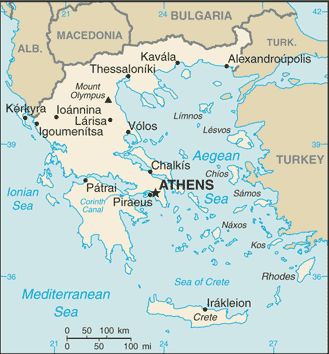Europe > Greece: Weather, Map, Costs and Travel Guide

Greece : When and where to go?
Click on a city for complete climate and weather tables
| Town | Jan | Feb | Mar | Apr | May | June | July | Aug | Sept | Oct | Nov | Dec |
| Athens |  |  |  |  |  |  |  |  |  |  |  |  |
| Corfou |  |  |  |  |  |  |  |  |  |  |  |  |
| Ikaria |  |  |  |  |  |  |  |  |  |  |  |  |
| Ios |  |  |  |  |  |  |  |  |  |  |  |  |
| Kos |  |  |  |  |  |  |  |  |  |  |  |  |
| Mykonos |  |  |  |  |  |  |  |  |  |  |  |  |
| Naxos (Agean Islands) |  |  |  |  |  |  |  |  |  |  |  |  |
| Rhodes |  |  |  |  |  |  |  |  |  |  |  |  |
| Santorin |  |  |  |  |  |  |  |  |  |  |  |  |
| Thessaloniki |  |  |  |  |  |  |  |  |  |  |  |  |
Greece: Climate & Weather
The climate is Mediterranean with very hot summers when temperatures can reach 40°C, coastal sea breezes add a touch of coolness, there is no rainfall in July and August.
Winter is the wettest season, especially in the west, with mild temperatures except in mountainous regions where it is cold and snowy.
The best time to visit Greece is in May or September and October so you can enjoy a pleasant climate during your walks and discoveries.
Weather today

Heavy Rain
Wind: 7 km/h
Precipitation forecast: 64,9 mm
> Full report and 7-days forecast
Data updated at 17:02 (local time)
At that time, the weather was:
 13 °C / Overcast
13 °C / Overcast
Greece: Map

Sponsored links
What to do in Greece
Athens, the capital, sets the standard in displaying treasures from the past: The Parthenon in Acropolis, the Theatre of Dionysus, and the Agora, to mention some of the most important ones. Stroll down Plaka's narrow streets, visit the National Archaeological Museum and the Goulandris Museum of Cycladic and Ancient Greek Art, and enjoy the atmosphere combining Eastern and Western cultures in this city. It may be polluted but it is also visually and culturally stunning.
In the Peloponnese peninsula there are several places definitely worth discovering: Of particular interest are Epidaurus, Mycenae, Corinth and Olympia.
Do not miss the monasteries of Meteora which are perched on rocky peaks, these were once connected to the mainland by ladders, later a winch basket system was used to reach the top.
The Cycladic islands are themselves a popular destination for tourists: Golden beaches, gleaming white houses, deep blue sky and a turquoise sea. Although some of these see little tourism others can be crowded at times by both Greek and foreign visitors.
Rhodes, in the Dodecanese archipelago, is remarkable for its medieval city and its beautiful buildings on Knights Avenue: Of special interest are the Castle, palace and acropolis.
For beach lovers, you can choose between those of the Sporades archipelago, the Ionian Islands, and of course those in Crete (See the article about Crete).
Greece: The basics
EU citizens only need an identity card to enter the country.
The currency in circulation is the Euro.
The budget required is still fairly moderate compared to the rest of Europe despite a sharp increase in recent years: You can eat a simple and copious meal for €15 and find a double room for €60. Choose a guesthouse if possible.
There are no particular health issues but do not forget protect yourself from the scorching sun.
Local transportation includes highly expensive inland flights, frequent buses, and ferries to travel to the islands. Once on an island, renting a scooter can be convenient. In the city, there are a lot of taxis which can be shared.
Popular souvenirs to take home: Woven bags, rugs, ceramics, the famous komboloi (worry beads), silver jewelry, honey, Ouzo.




